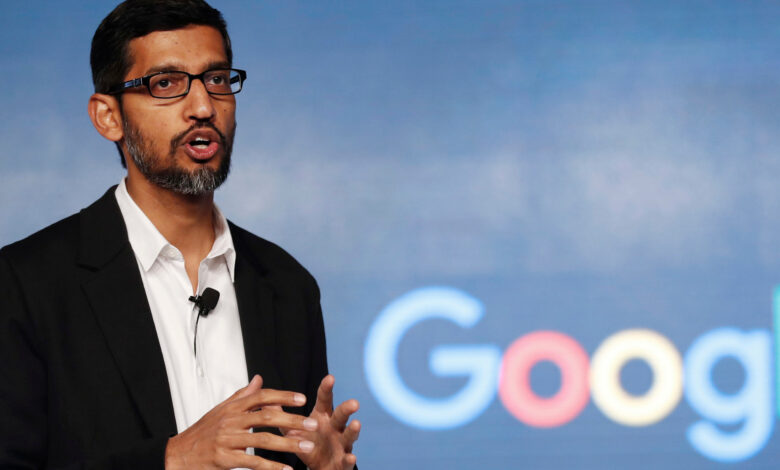The AI Revolution: CEOs at the Helm of Business Transformation
In the vibrant crossroads of technology and business, where silicon aligns with strategy, the undeniable impact of AI becomes apparent. This fascinating ambiguity surrounding control—whether it rests with the CEO or Artificial Intelligence—is not just a philosophical curiosity, but a pivotal consideration for the future of your company. We will consider the exploration of the intricate dance between corporate leadership and digital intellect. You will be able to reconsider your AI strategy, prompting a fresh perspective on power dynamics in this evolving landscape.
Sundar Pichai, the CEO of Google and Alphabet Inc, along with Nimrod Vromen, CEO of Consiglieri, offer valuable insights and perspectives on their approaches to AI adoption. Their contributions serve as key focal points in comprehending the dynamic landscape of AI in today’s business world
A recent survey conducted among 3,000 global executives sheds light on the perspectives of chief executives, highlighting their enthusiasm for AI adoption and their concerns about its effects on the workforce. The survey, conducted by International Business Machines Corp (IBM), offers a comprehensive view of how AI is poised to influence the corporate world in the coming years.
The survey revealed that a majority of chief executives are optimistic about the potential of AI to provide their organizations with a competitive edge in the future. According to the results, three out of four CEOs believe that organizations harnessing AI will gain a significant competitive advantage. Half of the surveyed CEOs have already initiated the integration of AI technology into their operations, signaling a forward-thinking approach.
Generative AI, a subset of AI, is expected to have a profound impact on the workforce. The survey indicates that 43% of CEOs anticipate that generative AI will lead to workforce reductions or redeployment. In contrast, 46% believe that AI will prompt them to hire additional workers. This split perspective on AI’s influence on employment underscores the complexity and uncertainty surrounding this transformative technology.
AI is not only seen as a means to augment the workforce but also as a valuable tool for decision-making. The survey found that 43% of organizations plan to use AI for strategic decision-making, while an additional 36% intend to employ AI for operational decisions. This indicates a growing recognition of AI’s ability to enhance the decision-making process, providing organizations with valuable insights and improved operational efficiency.
A notable finding from the survey is that many executives have not fully assessed the potential consequences of generative AI on the workforce. Only 28% of CEOs have evaluated these consequences, while another 36% plan to conduct such assessments within the next 12 months. This suggests that organizations are still in the early stages of understanding the full scope of AI’s impact on their workforce.
Google and Alphabet CEO Sundar Pichai talks about the rapid development of AI and its profound impact on both society and the business world. Pichai shed light on the transformative potential of AI, as well as the challenges and responsibilities that come with it.
Pichai highlights that the swift evolution of AI will affect “every product of every company.” His warning underscores the urgency for society to prepare for the technologies already in play. “We need to adapt as a society for it,” Pichai says.
“Every product of every company will be impacted by the quick development of AI.” – Sundar Pichai, CEO of Google and Alphabet
Pichai states that the potential disruption AI poses to various industries, particularly what he calls “knowledge workers.” He identifies writers, accountants, architects, and even software engineers as professionals whose roles may be significantly impacted. Pichai says, “This is going to impact every product across every company.”
Pichai says, “This is going to impact every product across every company.” He offers an example, saying, “For instance, you could be a radiologist, and if you think about five to 10 years from now, you’re going to have an AI collaborator with you. You come in the morning, let’s say you have a hundred things to go through, it may say, ‘these are the most serious cases you need to look at first.’”
Pichai acknowledges the concerns of Google employees, recognizing that the success of Google’s recently launched Bard program relies heavily on public testing and a willingness to learn from inevitable missteps. He reflects on the broader landscape of AI development, noting that competitive pressure among tech giants and startups is pushing society into the future at an astounding pace, whether we are fully prepared or not.
Pichai stresses the need for interdisciplinary collaboration in AI development, asserting that it’s not solely the domain of engineers. He highlights the importance of involving social scientists, ethicists, philosophers, and other experts to address the ethical, societal, and philosophical aspects of AI advancement.
Google has released a document outlining “recommendations for regulating AI.” Pichai believes society must quickly adapt with regulation, laws to punish abuse, treaties among nations to make AI safe for the world, as well as rules that “align with human values, including morality.”
“It’s not for a company to decide,” Pichai states. “This is why I think the development of this technology needs to include not just engineers but also social scientists, ethicists, philosophers, and so on.”
Nimrod Vromen, CEO of Consiglieri and cohost of the Startup Confidential podcast, is well aware of the transformative effects AI is having on the world of work. “As AI continues to advance, it is changing the way we live and work in fundamental ways,” he says. “In many industries, automation and AI are being used to replace human labor, and this trend is only set to accelerate in the coming years.”
The shift towards AI-driven automation is unmistakable, with machines and software increasingly taking over routine and repetitive tasks. Self-driving vehicles are rapidly replacing human drivers in various sectors, and AI-powered chatbots are becoming the first point of contact for handling customer service inquiries.

“AI offers immense potential to reshape industries and improve lives..” – Nimrod Vromen, CEO of Consiglieri
This drive towards automation holds the promise of increased productivity and efficiency. But it is not without its challenges. Vromen states, “As AI continues to advance, it is important for society to consider the ethical and social implications of this technology and to ensure that the benefits of automation are shared fairly.”
The move towards AI-driven automation underscores the importance of a thoughtful and inclusive approach to ensure that no one is left behind. Vromen advocates for proactive strategies to deal with potential job displacement, including retraining and upskilling to help workers adapt to the changing landscape.
Vromen highlights another profound aspect of AI’s influence on the world of work—the use of machine learning and data analysis to make better business decisions. He highlights, “Machine learning algorithms can analyze vast amounts of data and identify patterns and trends that humans might miss, and this can be used to improve a wide range of business processes.”
Machine learning algorithms are rewriting the rules of various industries by optimizing supply chains, enhancing marketing campaigns, and predicting customer behavior. The potential for AI in making data-driven decisions is vast, but it is not without its challenges.
Vromen raises one of the primary concerns: the issue of bias and transparency in machine learning. He observes, “There have been instances where machine learning algorithms have made biased decisions due to the data they were trained on, and this can have serious consequences.” As businesses increasingly rely on AI to make critical choices, addressing these biases becomes a paramount concern.
To tackle these issues, organizations must adopt ethical AI practices, including transparent data sourcing and model development. Vromen believes that vigilance in these areas can help prevent discriminatory outcomes and promote a more equitable and accountable use of AI in business.
Vromen raises a pivotal consideration: the approach of society towards the utilization of AI in our ever-changing world. He envisions that ‘With the help of AI, we have the capability to automate tasks that are tedious or perilous for humans, thereby liberating our time and resources for more significant endeavors.”
Vromen acknowledges the transformative potential of AI, highlighting how it can revolutionize industries and improve lives. He further stresses the importance of accelerating the rate of purposeful automation, allowing AI to take over tasks that are mundane or hazardous for humans.
However, he also recognizes the valid concerns surrounding the negative impacts of AI on society. “The increasing use of AI in the workforce,” Vromen warns, “could lead to widespread job displacement, as machines are able to perform tasks more efficiently and accurately than humans.”
This concern hits home for Vromen, who has dedicated over 15 years of his life to the field of corporate law. He candidly admits, “I, honestly, go to sleep each night thinking about the future of corporate law.” Vromen’s concerns resonate with many who grapple with the rapid pace of technological progress and the need to carefully consider the ethical and social implications of AI before it becomes widespread.
Pichai and Vromen are btoh concerned and optimistic about what the future holds. As AI continues its relentless advance, the dialogue on its role in shaping the future of work is more critical than ever. It is a conversation that requires the active involvement of all stakeholders, from business leaders to policymakers and workers themselves, to ensure that the promise of AI is harnessed to benefit society as a whole.




